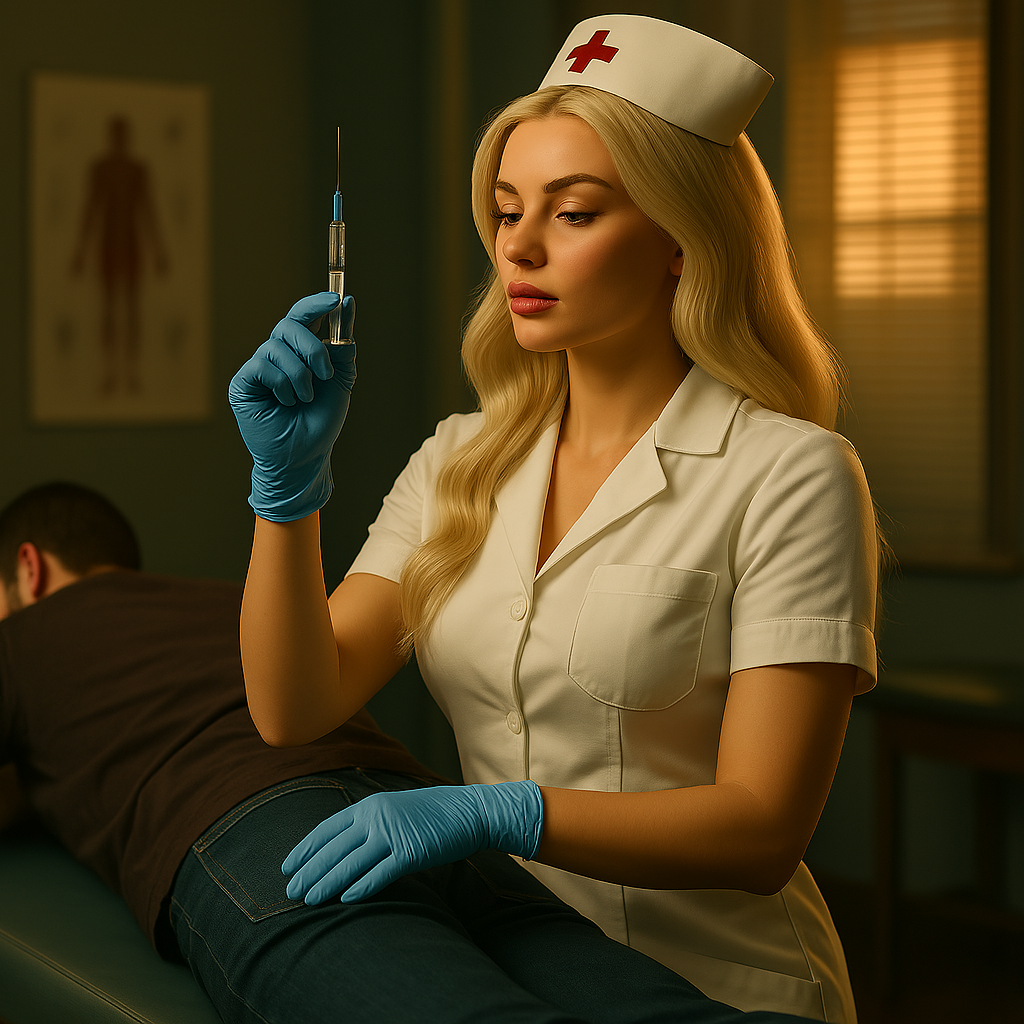Coughing After Testosterone Injection: Why It Happens and What You Can Do About It

Last Updated On March 29, 2025
Introduction
If you’ve ever experienced a sudden urge to cough immediately after your testosterone injection, you’re not alone. This phenomenon, often described as anything from a mild tickle to severe coughing fits, affects many men on testosterone replacement therapy (TRT). Coughing after testosterone injection can be alarming, especially when it occurs unexpectedly. This article explores the causes behind this reaction, practical solutions to minimize its occurrence, and reassurance about its typically benign nature.
While this reaction can be startling the first time it happens, understanding why it occurs and how to manage it can help alleviate anxiety and improve your overall TRT experience. Most importantly, these coughing episodes typically resolve quickly without any lasting negative effects.
Understanding Post-Injection Coughing
When coughing occurs after a testosterone injection, it typically happens immediately or within minutes of completing the injection. The sensation can range from a slight throat tickle to an intense, uncontrollable coughing spell. Some TRT users also report accompanying symptoms like chest tightness, shortness of breath, or momentary dizziness.
The good news? In the vast majority of cases, these symptoms are temporary and resolve completely within minutes without any lasting effects. Understanding why this happens can help alleviate anxiety and allow you to implement prevention strategies.
Primary Causes of Coughing After Testosterone Injection
1. Pulmonary Oil Microembolism (POME)
The most common cause of post-injection coughing is a phenomenon called Pulmonary Oil Microembolism (POME). This occurs when tiny droplets of oil-based testosterone enter the bloodstream during injection and travel to the lungs. When these oil microdroplets reach lung capillaries, they can cause temporary irritation, triggering the cough reflex.
POME is generally considered a benign reaction and usually resolves quickly as the body processes the small amount of oil. This explains why symptoms typically last only a few minutes.
2. Carrier Oil Sensitivities
Testosterone injections contain the hormone suspended in a carrier oil, and many users discover they’re sensitive to specific carrier oils. Common carrier oils include:
- Grapeseed oil
- Cottonseed oil
- Sesame oil
- MCT (medium-chain triglyceride) oil
- Castor oil
- Ethyl oleate
From community reports, grapeseed oil appears particularly likely to cause coughing reactions in sensitive individuals. Many users report that switching to a different carrier oil, particularly MCT oil, eliminated their coughing episodes entirely.
3. Vascular Injection
Accidentally injecting into a blood vessel or nicking a vein can increase the likelihood of testosterone entering the bloodstream directly. This can lead to a more rapid onset of coughing as the oil reaches the pulmonary circulation faster and in higher concentrations.
4. Injection Technique Issues
Several aspects of injection technique may contribute to post-injection coughing:
- Injection speed (injecting too quickly)
- Needle size and length
- Injection depth
- Failure to aspirate before injecting (although this practice is debated)
- Angle of needle insertion
5. Testosterone Ester Type
Different testosterone esters (cypionate, enanthate, propionate) have different chemical properties and may cause varying reactions. Some users report more frequent coughing with certain esters than others. This might explain why I personally noticed coughing only after switching to testosterone enanthate.
6. Injection Site Vascularization
Some injection sites have higher vascularization (more blood vessels) than others. Injecting into highly vascularized areas increases the risk of inadvertently entering a blood vessel, potentially triggering a coughing reaction.
7. Preservatives and Additives
Commercial testosterone preparations often contain preservatives, antimicrobials, or other additives beyond just the carrier oil. These compounds can potentially trigger reactions in sensitive individuals.
8. Vasovagal Response
For some individuals, the act of injection itself can trigger a vasovagal response—a reflex involving the vagus nerve—which might include coughing among other symptoms such as dizziness or light-headedness.
9. Testosterone Concentration
Higher concentration formulations (e.g., 250mg/ml vs 100mg/ml) may cause different reactions due to their physical properties and how they interact with tissues when injected.
10. Temperature of Injection
Cold testosterone solutions injected directly from refrigeration might cause different tissue reactions than room temperature solutions, potentially influencing how the body processes the injection.
Community Experiences and Solutions
A review of TRT community discussions reveals that coughing episodes are relatively common but vary significantly in frequency and severity among users. While some men rarely experience post-injection coughing, others report it frequently enough to cause concern.
Community consensus points to several practical solutions that have helped many users minimize or eliminate coughing episodes:
- Switching carrier oils: Many users who experienced severe coughing with grapeseed oil-based testosterone reported complete resolution after switching to MCT oil-based formulations.
- Improving injection technique: Slower injection speed, proper depth, and careful site selection appear to reduce the likelihood of coughing.
- Changing injection sites: Some users found that certain injection locations were more likely to trigger coughing than others. Experimenting with different sites (gluteal, ventral gluteal, vastus lateralis, deltoid) may help identify less problematic locations.
- Using different needle gauges: Thinner needles (25G-29G) were commonly recommended to reduce trauma and the likelihood of hitting blood vessels.
Respected experts within TRT communities consistently recommend addressing carrier oil sensitivities first before making other changes to injection protocols.
Practical Steps to Minimize Coughing Episodes

Based on both community experiences and medical understanding, here are practical steps you can take to reduce your chances of experiencing post-injection coughing:
1. Optimize Injection Technique
- Inject slowly: Taking 30-60 seconds to deliver the full dose allows the oil to disperse gradually
- Use appropriate needle length: Ensure you’re reaching the intended tissue depth
- Consider your injection angle: 90-degree angles work well for most intramuscular injections
- Warm the oil: Allow refrigerated testosterone to reach room temperature before injecting
2. Consider Carrier Oil Alternatives
If you consistently experience coughing with your current testosterone preparation, discuss alternative carrier oils with your healthcare provider or compounding pharmacy. Many users find success with:
- MCT oil-based testosterone (often the best tolerated)
- Ethyl oleate preparations (thinner and often well-tolerated)
- Sesame oil (if grapeseed oil is causing reactions)
3. Injection Site Selection
Some injection sites may be less likely to cause coughing reactions:
- Ventral gluteal (side of hip) often has fewer large blood vessels
- Upper outer quadrant of gluteal muscles (traditional site)
- Vastus lateralis (outer thigh) when properly identified
4. Adjust Your Protocol
- Consider more frequent, smaller volume injections
- Try different testosterone esters to see if one works better for you
- If using higher concentration testosterone (200-300mg/ml), try a lower concentration formulation
When to Seek Medical Advice
While most post-injection coughing episodes are benign and self-limiting, certain symptoms warrant medical attention:
- Coughing that persists for more than 10-15 minutes
- Severe shortness of breath or difficulty breathing
- Chest pain that doesn’t quickly resolve
- Coughing up blood
- High fever developing after injection
- Severe pain, redness, or swelling at the injection site
These could indicate a more serious reaction or complication and should be evaluated by a healthcare professional promptly.
My Personal Experience with Post-Injection Coughing
As someone who has personally experienced this phenomenon, I understand the concern it can cause. For years, my TRT injections were uneventful with no side effects whatsoever. It wasn’t until I switched to a new testosterone brand and ester (Enanthate) that I began experiencing occasional coughing fits after injections. These episodes varied from mild to relatively severe, but importantly, they always subsided within 2-3 minutes.
The key lesson I learned through this experience was to remain calm and let it pass. Despite the momentary discomfort, these coughing episodes never resulted in any negative outcomes. Understanding that this is a well-documented phenomenon helped alleviate anxiety during these episodes.
My experience aligns with what many other TRT users report—coughing episodes often correlate with changes in formulation, and while uncomfortable, they’re typically harmless and short-lived. Staying relaxed rather than panicking made these episodes much easier to manage.
Conclusion
Coughing after testosterone injection, while startling and uncomfortable, is typically a benign reaction that resolves quickly without intervention. By understanding the underlying causes—particularly POME and carrier oil sensitivities—you can take practical steps to minimize its occurrence.
If you experience this phenomenon, remember:
- It’s a relatively common reaction among TRT users
- In most cases, it passes within minutes without consequences
- Simple adjustments to your injection protocol may prevent it
- Changing carrier oils often provides a complete solution
Most importantly, don’t let the fear of coughing deter you from your TRT protocol. With proper technique and potentially some adjustments to your testosterone formulation, you can minimize or eliminate these episodes while continuing to enjoy the benefits of optimized hormone levels.